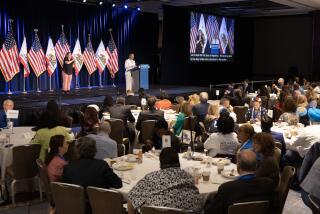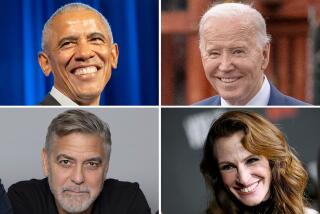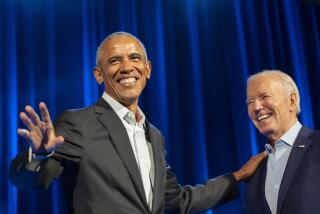White House Events Raised Cash for Health Care Fight
- Share via
WASHINGTON — In mid-1994, more than two years before he faced reelection, President Clinton hosted a series of breakfasts at the White House to raise large sums of money--as much as $50,000 to $100,000 per participant--to promote his health care plan, according to individuals familiar with the events.
New documents and interviews show that long before any of the now-controversial White House coffee klatches during his presidential campaign, Clinton already had seized on private sessions in the executive mansion as a way to generate quick cash for his top priorities.
An internal White House memo indicates that the breakfasts brought in more than $1 million.
“The purpose was to raise some serious money quickly,” said a person knowledgeable about the events. “People were asked either beforehand or afterwards if they would contribute high dollars.” The money was used for media advertising.
But he added: “There was no actual solicitation at the events themselves.”
In recent months, White House and Democratic officials have insisted that the coffees--which numbered about 100 in 1995 and 1996--were not fund-raisers but rather an opportunity for supporters to talk with the president. They have said that only later in the campaign, under intense pressures to match a Republican money-raising advantage, did they become more focused on fund-raising. Even then, they maintained, no price tag was put on participation.
But the 1994 fund-raising effort, a precursor that has not previously come to light, shows a direct link between providing access and getting donations and was conducted specifically to raise money, sources said. The disclosure may heighten criticism that Clinton and his party unduly traded on the White House and sold access to those who wanted private time with him or sought to ingratiate themselves with the chief executive.
*
The program, mentioned in documents released from the files of Harold M. Ickes, the former deputy White House chief of staff, had a fund-raising goal of $1.3 million and was run through the Democratic National Committee.
A White House official declined to respond to queries about the breakfasts, saying, “We are looking into the questions regarding the health care campaign.”
Democratic Communications Director Amy Weiss Tobe initially said Thursday that there were only two health care breakfasts and that “there was no money raised either before or afterwards.”
Later in the day, she said: “I was misinformed. Somebody gave me the wrong information who was not familiar with the breakfasts.”
She said, however, that she could provide few details.
A six-month fund-raising count compiled by Ickes on June 27, 1995, includes a reference to eight health care breakfasts “w/Potus”--the White House acronym for President of the United States. The total revenues: $1,315,000.
The money was used for television advertising and other initiatives aimed at building support in key states for Clinton’s ambitious health care reform proposal, the major initiative of his first term. Another Ickes memo, dated Oct. 20, 1994, referred to “the disposition of the $5.5 million DNC health-care media monies.”
Tobe said that the Democrats spent $876,000 on media, $2.1 million on production and consulting costs and additional money on a grass-roots campaign to mobilize support.
Clinton’s health care proposal ultimately was defeated in Congress after a far more expensive advertising television blitz by its opponents.
Sources familiar with the sessions said they occurred in the summer months. The number of guests was as few as four people, making them more intimate than the coffees.
The pitch to prospective donors was more brazen than the coffee program, the sources said. They said that those who were approached, including some with health care interests, were told that they needed to help bankroll the health care advertising campaign.
“Generally, [the national committee] didn’t say give $50,000 and come to a coffee in 1995 and 1996,” one source said. “That wasn’t necessarily the case for the health care breakfasts.”
The guests joined the president for “a free-ranging discussion about health care,” said another source. “The breakfasts were designed to talk about the importance of the health care initiative, about the real fight we had on our hands with it and about the need to get resources” to make the case for it.
The breakfasts were principally handled by Terence R. McAuliffe, who was then the Democrats’ national finance chairman, sources said. He later held the same post for the Clinton-Gore campaign and was instrumental in orchestrating the initial White House coffees.
But one official emphasized that the 1994 events--a limited-targeted fund-raising appeal--did not lead to the later sessions, which began as an effort to give energy to the party’s supporters and private fund-raisers to work for the president’s reelection. McAuliffe was traveling Thursday and could not be reached.
Tobe said the Democrats do not yet have a list of breakfast attendees available.
But Federal Election Commission records show a total of nearly $1.7 million came to the national committee from individuals, labor unions and corporations earmarked for the party’s national health care account between May 31 and Sept. 26, 1994--around the time of the breakfasts.
Sixteen contributions were for amounts of $50,000 to $202,925.
Among the donors was the National Education Assn., $200,000; the National Union of Hospital and Health Care Employees, $250,000; Sol Price, the founder of the Price Club discount chain, $100,000; and Marvin Davis, the former owner of Twentieth Century Fox, $100,000.
*
Price said in an interview from La Jolla that he pledged $100,000 to the Democrats in 1994 and earmarked the funds for the health care initiative.
He recalled that at some point before the 1994 elections, he had “a nice social luncheon” at the White House with First Lady Hilary Rodham Clinton, who spearheaded the administration’s health care reform effort, and several others, including McAuliffe.
A spokeswoman for the teachers organization, which actively supported Clinton’s health care proposal, said the union made its contribution to the health care media drive at the request of the Democratic National Committee.
“It was not a contribution to the DNC but to the health care” campaign, said Mary Elizabeth Teasley, the association’s director of government relations.
The breakfasts were by no means the only effort to raise money for the health care advertising drive. The Democrats also retained Evergreen Partners Inc., a fund-raising firm in Scotch Plains, N.J.
“It was really one heck of a tough sell,” said Karen Kessler, one of the firm’s partners. “Why did the bill go down in flames? There probably was not a whole lot of support at that time for what they were trying to do.”
Researchers Edith Stanley in Washington and Janet Lundblad in Los Angeles contributed to this story.
More to Read
Get the L.A. Times Politics newsletter
Deeply reported insights into legislation, politics and policy from Sacramento, Washington and beyond. In your inbox twice per week.
You may occasionally receive promotional content from the Los Angeles Times.










